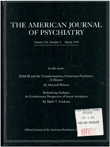The face validity of the DSM-III and DSM-III-R criteria sets for borderline personality disorder
Abstract
OBJECTIVE: The main objective of this study was to determine the congruence between DSM-III and DSM-III-R diagnoses of borderline personality disorder derived through the use of semistructured research interviews or given by experienced clinicians after lengthy consultations with an interdisciplinary team. METHOD: The presence of the DSM-III and DSM-III-R criteria sets for borderline personality disorder was assessed in a study group of 253 patients with personality disorders (148 inpatients and 105 outpatients) by raters who were blind to clinical diagnoses and who used information from two semistructured interviews of proven reliability. These diagnoses were then compared with "longitudinal expert all data" (LEAD) standard clinical diagnoses provided by therapists specifically asked to base their diagnoses on DSM criteria. RESULTS: Both criteria sets were found to be overinclusive when compared with the LEAD standard. Most criteria were also found to lack specificity. However, the three DSM-III-R criteria that are new or revisions of DSM-III criteria were found to be more specific, and raising the cutoff on the DSM-III-R criteria from five to six improved specificity. CONCLUSIONS: Both the DSM-III and DSM-III-R criteria sets for borderline personality disorder as assessed by semistructured interview lack face validity because they are nonspecific when compared with a rigorous but representative clinical standard, and the results of studies using these criteria sets may prove misleading to researchers and clinicians because they seem to define a nonspecific type of serious character pathology.
Access content
To read the fulltext, please use one of the options below to sign in or purchase access.- Personal login
- Institutional Login
- Sign in via OpenAthens
- Register for access
-
Please login/register if you wish to pair your device and check access availability.
Not a subscriber?
PsychiatryOnline subscription options offer access to the DSM-5 library, books, journals, CME, and patient resources. This all-in-one virtual library provides psychiatrists and mental health professionals with key resources for diagnosis, treatment, research, and professional development.
Need more help? PsychiatryOnline Customer Service may be reached by emailing [email protected] or by calling 800-368-5777 (in the U.S.) or 703-907-7322 (outside the U.S.).



